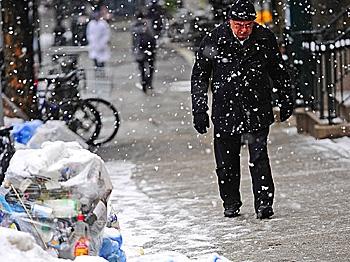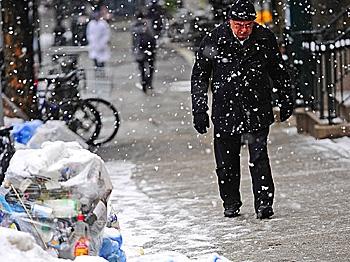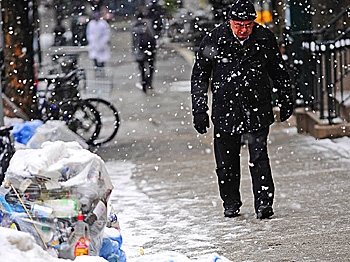Snow can change the character of a midwestern city within hours. When it snows, everything suddenly looks cleaner. Like a luxurious spread of cream cheese on a burnt bagel, snow conceals a city’s filth and blemishes, presenting a more pristine persona—at least for a little while.
A few warmer days and the illusion vanishes. Somehow the trash on my street always seems to multiply under the white blanket.
After our last major melt, I went outside to clean up what the snow had previously hidden from view: An empty package of mentholated Marlboros, spent lighters, fast-food wrappers, a Coke Zero can (smashed flat), a large McDonald’s cup, a stunning array of plastic grocery bags, various receipts, several takeout menus, and a free sample of Woolite.
This year an annual delivery punctuated the mix of post-melt winter refuse—2011 phone books were distributed to our neighborhood. As always they’re free, but not everyone accepted the gift. The unwanted bound stacks of yellow paper and their accompanying yellow bags reading “The Moment You Need It…” were soon littering the block with the rest of the discards. Cue the crying Indian.
I should mention that I live near a university; many of my neighbors are college students. Given the number of unclaimed books hanging from their bags on gates, hiding under shrubs, and abandoned in yards over a week after delivery, these tech-savvy late teens and early twenty-somethings have no use for a relic like a Yellowbook (or its competing rival, the yet-to-be-delivered Yellow Pages). Apparently they also have little understanding of how to properly dispose of something.
While I am old enough to remember relying on this reference, I don’t think I’ve actually cracked one open in several years—like virtually anyone with an Internet connection, I look up phone numbers on the computer.
The experience prompted me to research if I could opt out of future phone book deliveries. It was pretty easy to do. If you don’t need your phone book I highly recommend it.
I wondered what our ancestors would’ve made of all the over-800-page tomes we print that so quickly become trash. I saw a television program recently that discussed how paper was manufactured in post-colonial America. Before the days of cheap newsprint, and the technology required to create pages from wood pulp, paper was made from a slurry of the town’s old rags. Back then, making paper—like nearly everything else—was a craft that took time and effort.
Today, paper costs little to produce, at least in dollars, so little stops us from making as much as we want. If it manages to make its way into the proper container, paper can be recycled.
A few warmer days and the illusion vanishes. Somehow the trash on my street always seems to multiply under the white blanket.
After our last major melt, I went outside to clean up what the snow had previously hidden from view: An empty package of mentholated Marlboros, spent lighters, fast-food wrappers, a Coke Zero can (smashed flat), a large McDonald’s cup, a stunning array of plastic grocery bags, various receipts, several takeout menus, and a free sample of Woolite.
This year an annual delivery punctuated the mix of post-melt winter refuse—2011 phone books were distributed to our neighborhood. As always they’re free, but not everyone accepted the gift. The unwanted bound stacks of yellow paper and their accompanying yellow bags reading “The Moment You Need It…” were soon littering the block with the rest of the discards. Cue the crying Indian.
I should mention that I live near a university; many of my neighbors are college students. Given the number of unclaimed books hanging from their bags on gates, hiding under shrubs, and abandoned in yards over a week after delivery, these tech-savvy late teens and early twenty-somethings have no use for a relic like a Yellowbook (or its competing rival, the yet-to-be-delivered Yellow Pages). Apparently they also have little understanding of how to properly dispose of something.
While I am old enough to remember relying on this reference, I don’t think I’ve actually cracked one open in several years—like virtually anyone with an Internet connection, I look up phone numbers on the computer.
The experience prompted me to research if I could opt out of future phone book deliveries. It was pretty easy to do. If you don’t need your phone book I highly recommend it.
I wondered what our ancestors would’ve made of all the over-800-page tomes we print that so quickly become trash. I saw a television program recently that discussed how paper was manufactured in post-colonial America. Before the days of cheap newsprint, and the technology required to create pages from wood pulp, paper was made from a slurry of the town’s old rags. Back then, making paper—like nearly everything else—was a craft that took time and effort.
Today, paper costs little to produce, at least in dollars, so little stops us from making as much as we want. If it manages to make its way into the proper container, paper can be recycled.







